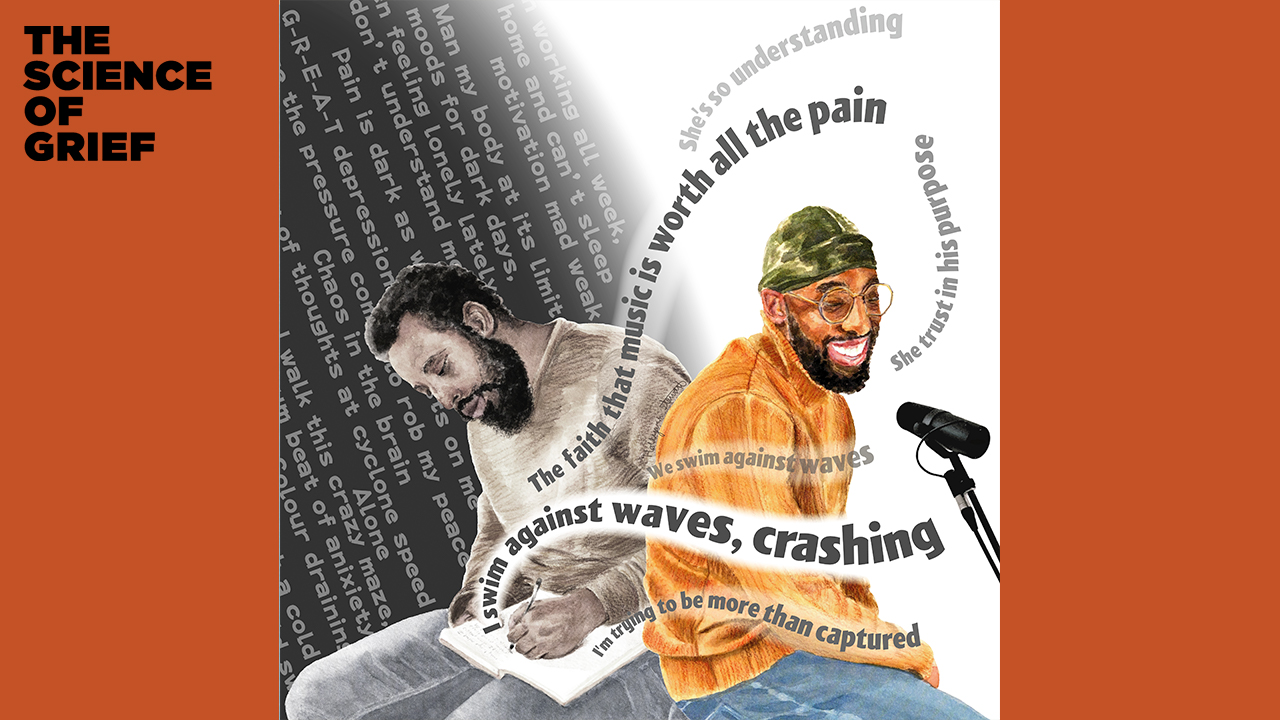Acknowledging Grief and Embracing Therapy with Joshua Watkis and Damika Houston
Joshua Watkis shares his experience losing several loved ones in a short amount of time and how he moved forward while honoring their memory. Then, counselor Damika Houston offers tips for young adults who are experiencing grief or considering therapy.

The Science of Grief, produced by WDET and Science Gallery Detroit, explores the stories, science and solutions around grief and mental health, making space for young adults to share their stories, but also lead the conversation.
Joshua Watkis lost four loved ones in a short amount of time. Those consecutive losses led to severe depression for Joshua. When he began to acknowledge his grief and seek out therapy, Joshua found a way to move forward while honoring the memory of his loved ones.
Never miss an episode.
Subscribe where ever you listen to podcasts:
Apple Podcast — Spotify — NPR — Stitcher — Google Podcasts — TuneIn
The Isolation of Virtual Funerals
During the pandemic, virtual funerals were sometimes the only option for grieving families and friends to attend.
Last year, Joshua Watkis attended two of them. For him, the experience was very isolating compared to an in-person funeral.
“While there’s so much grief and pain and angst in the air, you kind of all go through it together. That’s what a funeral does. It gives you a moment of community, where you’re around people who are experiencing the same loss that you’ve experienced,” he says.
“A virtual funeral … you’re just watching something happen, and the connectedness you feel in a room just isn’t there. So, it’s very isolating.”
Recognizing Warning Signs, Getting Help
When Joshua was grieving the loss of four loved ones, he was first trying to push through the grief, and was emotionally tuned out. It took a toll on his personal relationships.
“Being in a place where I realized it was affecting my loved ones, and the way I was with my family, that was what pushed me to realize I needed help. I didn’t even know that things were wrong with other people. That’s how checked out I was.”
Joshua was first using escapism to cope with the loss. He watched a lot of anime and dug into his local arts scene.
While the escape provided Joshua with a small amount of relief in his mood, he was struggling with depression and was neglecting his physical health as a result.
“Being in a place where I realized it was affecting my loved ones, and the way I was with my family, that was what pushed me to realize I needed help.” –Joshua Watkis
Something as small as hair care was a sign for Joshua that he needed to start taking care of himself again.
“Let me start brushing my hair and taking care of it. That sounds like a little thing, but it was such a big shift in how I look at myself and how I look at my own health.”
The turning point for Joshua’s grieving process came when he sought out professional help.
Once he began talking with a therapist, he realized how important it was to acknowledge his grief in order to move forward with his life.
“It was the first time I said out loud everybody I had lost all at once,” he says.
Naming the people he lost and the emotions he felt was a watershed moment for Joshua.
“It was just this really beautiful moment of release for me. To say their names, to say where I knew them from, and what they meant to me,” he says.
“It felt more like freedom than anything.”
After acknowledging his grief, Joshua began allowing himself to live, smile and experience joy, while still accepting and grieving the loss of his loved ones.
Joshua says one long-term lesson he learned was that therapy is not just about addressing a certain mental health crisis, but should be part of the regular maintenance of his mental health.
Tips and Takeaways from Counselor Damika Houston
Damika Houston is a licensed professional counselor and owner of Healing Minds in Grand Rapids. She spoke with host Natasha T Miller and offered the following tips for people who are experiencing grief or considering starting therapy.
- Name and accept the emotions you’re feeling, acknowledge the loss and allow yourself to grieve.
- Find community and talk to someone you trust. Friends, family and even support groups on Facebook are a good place to start.
- Therapy is not just for mental health crises. Treat mental health like physical health, with regular maintenance.
- Escapism through things like exercise, books and television can be healthy, but it needs to be positive and help you heal. If you escape to a negative place, it can be unhealthy. Ask yourself if your escape is benefiting you.
- Try writing letters, journaling, drawing or expressing yourself some other way to allow yourself to say goodbye to the person you’ve lost.
Previous Episodes of Science of Grief
Seeking Help
While this podcast is meant to make space for sharing stories and solutions, it is not a substitute for professional help. If you have a mental health concern and need someone to talk to, please contact a mental health professional or your doctor.
If you are in a suicidal crisis or emotional distress, please call the National Suicide Prevention Lifeline: 800-273-8255.
The Science of Grief podcast is a collaboration between WDET and Science Gallery Detroit, and is supported by the Children’s Foundation of Michigan, MSUFCU and Science Sandbox.

Trusted, accurate, up-to-date
WDET is here to keep you informed on essential information, news and resources related to COVID-19.
This is a stressful, insecure time for many. So it’s more important than ever for you, our listeners and readers, who are able to donate to keep supporting WDET’s mission. Please make a gift today.
